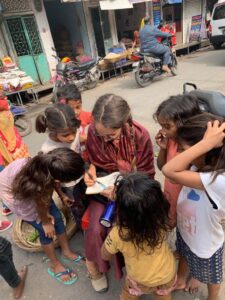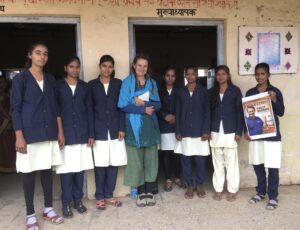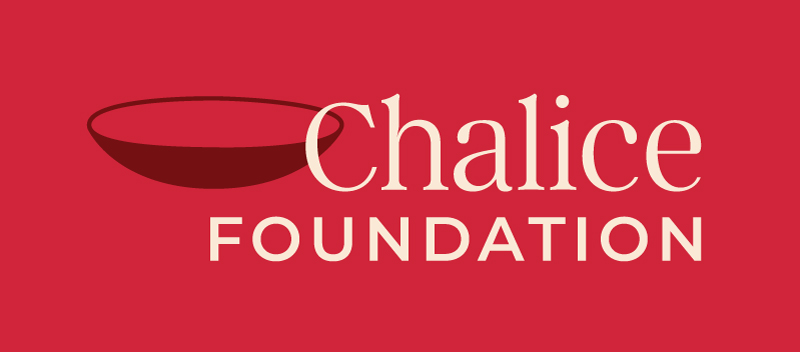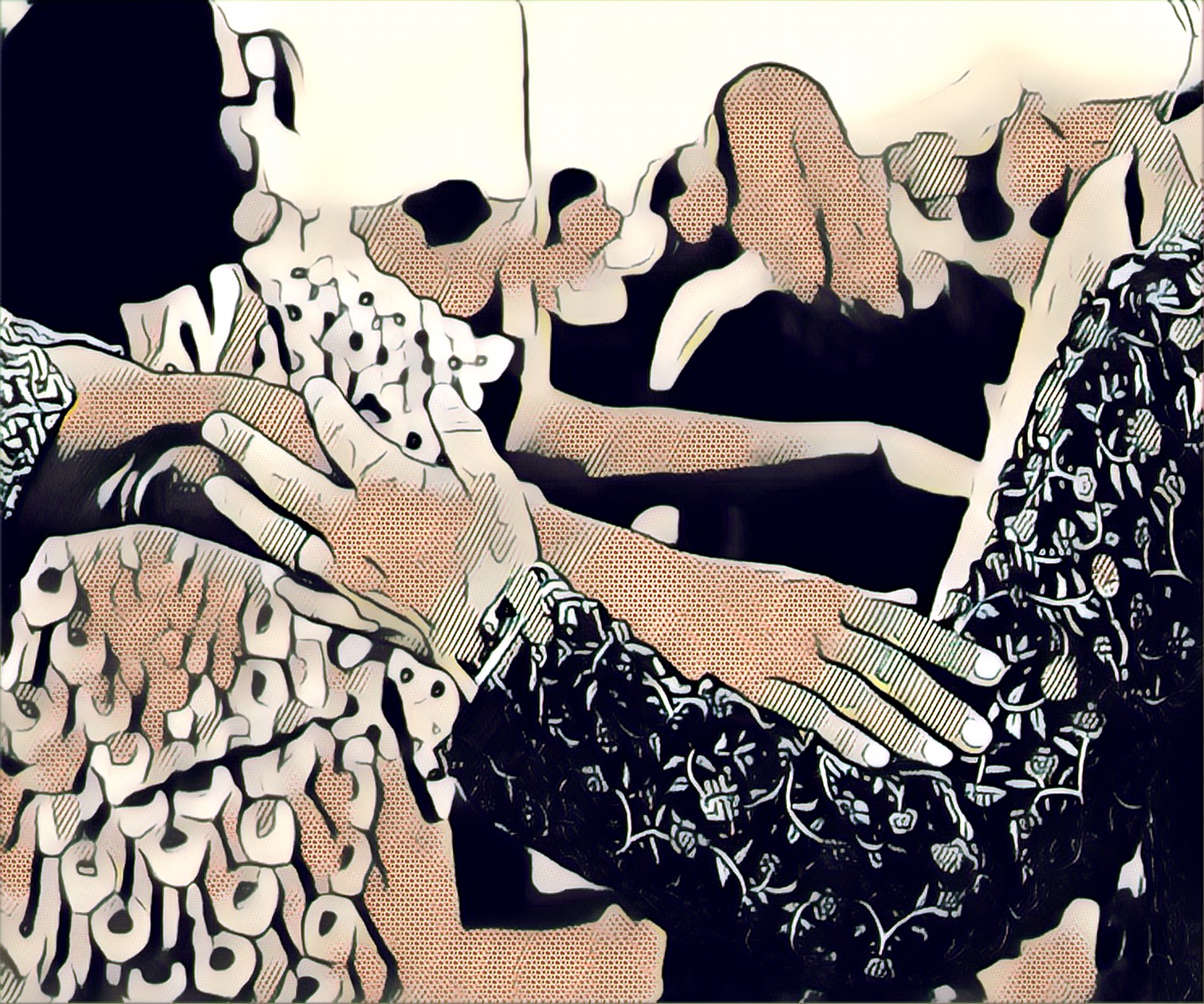A few months ago we featured Mark Balla’s work with Operation Toilets on The Leak and we are very excited to feature a blog by Mark’s sister Trace who created a book Cycling Together after visiting India with her brother to ensure that girls can continue to go to school once they start menstruating.
I made this book to support the Operation Toilets project, so that girls can remain in education. Once girls get their periods there is a high drop out rate at many schools in India. Much of this is due to lack of safety and privacy because there are either no toilets or they are in terrible conditions.
I also wanted to empower girls with privilege who feel the weight of the world’s troubles – to find something relatable through which they can realistically make a huge positive difference to the lives of others.

Drawing in the marketplace.
I was invited to India on a book tour for Australian children’s authors, so asked my brother Mark, whose project Operation Toilets sounded so inspiring if I might go and meet some of the girls who benefited from this project. I wanted to make a book about those girls who had a toilet and those who didn’t, and the profound changes that happened when they did. As a woman I would have the benefit of being able to speak with the girls in a way my brother never could. (See Mark’s blog here for more on Operation Toilets.)
We went to many schools across India. Some conditions were really shocking. Some schools had no toilets, some were filthy, or little more than rubble, with snakes, tigers, scorpions and long grass, and a long way from classrooms. The girls felt so unsafe they avoided drinking water and simply didn’t go. Some got kidney infections from holding on while others quit school.
It was so heart warming to meet and hear from the girls who got new toilets through the project and whose lives had changed as a result. To see they now had a real chance to fulfil their ambitions, and what this implied for their futures. I asked many girls what their dreams were and was thrilled by their level of ambition.
I also met many girls in dire circumstances. Like girls who spent the day picking off rubbish tips to make a living. I met with World Vision workers bringing hygiene education and leadership programs into the schools, Rotary club members supporting the cause, and people working on projects around the themes of poverty, hygiene and education.
Also interesting for me was visiting the village of Piplantri, where 111 trees are planted each time a girl child is born to ensure her education. But that is another story, one well worth Googling! [Ed: You can read about Piplantri here.] We also visited a bio public toilet that created gas for lighting, water for trees and oil for cooking.
Educating girls is rated number six of the top 100 solutions of greatest impact to reverse global warming of Drawdown: The Most Comprehensive Plan Ever Proposed to reverse Global Warming edited by Paul Hawken. This list is based on meticulous research compiled by over 200 scientists and policy makers. www.projectdrawdown.org
I was really inspired to learn that educating girls was sixth of the Project Drawdown solutions and found it fascinating to understand the reasons why …

Visiting schools with Operation Toilets.
I have been an avid environmental activist and advocate for bike riding for many years. So I slipped in the girls’ modes of transport to school. At the start one goes by moped, one walking. At the end they cycle together. Cycling together is also a play on words, around the fact that women living in close proximity often have their menstruation cycles together. The title holds the feeling of sisterhood, of not leaving anyone behind, of caring for the earth, of freedom and liberation, of joy and wellbeing.
On a personal level I have found the whole experience to be very healing. My mother had to leave school at age 14 when her father died, to work in a newsagent to help support the family. My father also left school around the age of 12 due to the war in Europe. Later they returned to education.
Also my own menstruation journey was marred, both by the lack of skilled communication by my mother, shame was quite a normal thing in those days, as well as pad burning incinerators in school toilet cubicles. I was really uncomfortable, was never shown how to use them, and I shall spare you any further detail. So I was happy to hear of some celebratory and honouring experiences of the girls on my travels, which I wove into the story. At the end of the book I include some crafty ideas girls can do. I especially like my idea of making a candleholder and burning a candle to let your household know when to honour that time for you. I would love to see that as a way forward in changing the culture of shame to one of honouring. I wonder if the craft activities may be used as a fundraiser activity day.
 Currently, with much of India in lockdown including schools, the toilet project is going ahead without students being a hindrance to building progress. I hope Cycling Together will inspire readers: girls, boys, families, schools and communities to find creative ways to fundraise for Operation Toilets.
Currently, with much of India in lockdown including schools, the toilet project is going ahead without students being a hindrance to building progress. I hope Cycling Together will inspire readers: girls, boys, families, schools and communities to find creative ways to fundraise for Operation Toilets.
May all girls have the dignity of celebrating who they are, and the chance to fulfil their dreams.
Cycling Together is available as a paperback or digital eBook and all profits go to Operation Toilets, https://traceballa.com/cyclingtogether
Listen to the podcast of the launch: https://saltgrasspodcast.com/2021/09/21/s4-e05-cycling-together/

Trace Balla
Trace Balla is a children’s book author and illustrator, winner of the Children’s Book Council of Australia Children’s Book of the Year: Early Readers award, the Wilderness Society Picture Book Award and the Readings Children’s Book Prize. Trace also works as an illustrator, inspirational speaker and workshop facilitator, and is a favourite amongst kids and adults alike. She lives in Djaara Country, Australia.


